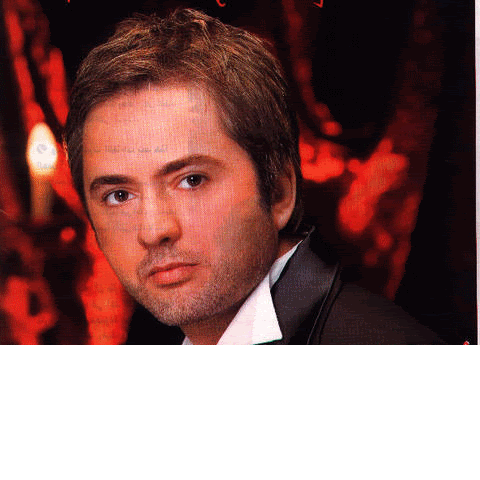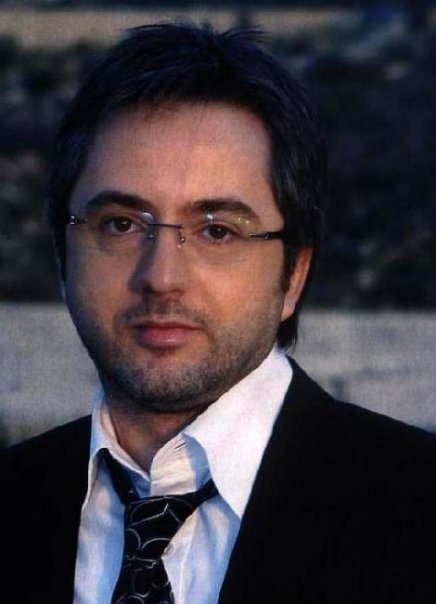IN TODAY’S COMPETITIVE MUSIC MARKET, EVERYONE IS DOING THEIR BEST TO FIT IN, EVEN IF IT MEANS VOID COMMERCIAL RELEASES, BUT FOR MARWAN KHOURY, HIS FOLLOWING HIS HEART WAS HIS CLAIM TO FAME
by Sarah el Sirgany.
Had enough of all the mushy, mundane love songs? Then listen to Marwan Khoury’s “Kel El-Kasayed” (All the Poems) to experience some genuine heartfelt lyrics being sung to the right tune it will probably leave a silly nostalgic smirk on your face.
True, there have been some touching love songs in the past few years. But if you read the credits at the end of a video clip, you will know that many of those songs were masterminded by Khoury. For all you women who identified with the lyrics of Carole Samaha’s 2003 hit “Tala’ Fiye Hiek” (Look At Me), you can thank this Lebanese artist for that. So, how did Khoury put together such a touching song? He explains that, “An artist should have spiritual transparency and the ability to detect and understand all emotions around him. Not only women’s feelings but the feelings of another man, another human being, all the human feelings.”
Persistence is the Key
Khoury tried his hand at composing music as a child and his talents landed him a national award presented by former Lebanese President Amin Gemayel. In 1987, he studied music at the Universite Saint-Esprit de Kaslik in his home country. The following year he worked on a four-track album that was never released. “You can’t actually call it an album,” says Khoury who wrote the lyrics, the music and performed the four songs then gave them to radio stations in Lebanon. “It was something I loved doing. It was the first thing I composed and sang.” While he didn’t get the success he desired, Khoury soon made a discovery that would propel him in a new direction.
In the years that came, specifically between 1989 and 1996, Khoury played it safe. He slowly made a name for him self among industry professionals working as a keyboardist with several bands. He later appeared on LBC’s many music programs including the famous Studio El-Fan (The Art Studio) and played behind Lebanon’s singing legend Sabah among other stars. “I thought it was easier to start as a musician with bands But all the time, I had singing and music composition in mind. They came in time, one after the other,” Khoury explains.

The route to fame was not an easy route to take. “It took some support from here and there and also an obstacle here and a problem there. Something would run smoothly and another would stop. But I had the persistence.” And the reward came soon afterwards.
His career as a composer was jump-started with his 1997 “Lasbor ‘Ala Wela” (Patience). The single which he wrote, composed and sang was released on a compilation album produced by Relax In. A very smart and fortunate move on Khoury’s part it definitely got him noticed. Soon after, he collaborated with Nawal El-Zoghby and considers 1999’s “Tia,” dedicated to her daughter, to be his first hit as a songwriter/composer. His collaboration with El-Zoghby yielded several hits like “Aalbi Dak” (My Heart Has Beaten) and “Dal’ouna.”
Tick Tock
Since the release of the hit singles in the late 90s, Khoury has built himself a reputable reputation as a songwriter and a composer. His ability to materialize romantic feelings into words and his selective nature get him many requests to write and compose songs. He never calls a singer to offer a melody or a song; he receives the calls, “unless they had asked for a song a long time ago and I have finally developed a suitable one.”
He is currently working on finding a suitable song for Elissa, whom he says has “a smooth and heartfelt” voice. Khoury admits that it sometimes takes a “long time to find the suitable song.” Some artists can be fortunate to have one of Khoury’s songs available immediately, since he creates and saves songs until the right singer comes along which is exactly what happened with Saber El-Roba’i. “A’zz El-Habeib” (The Dearest of Loved Ones). The song had been sitting on Khoury’s shelf for a year until the Algerian singer called. The song was ready to go.
“[A singer] would ask [me], ‘Marwan, why don’t you give me [a song]?’ and I would reply that ‘I won’t give you anything unless it is suitable,’” explains Khoury. “Sometimes they get a bit upset, but in time they understand me and why I think in this way.” He affirms that no serious problems have taken place.
Most singers have to develop patience when working with Khoury, because he takes a great deal of time creating songs. He clarifies, “Usually, I don’t like working on demand. I like working according to my mood and preferences.”
He takes even more time if it is Khoury’s second or third collaboration with the same artist to ensure he is not repeating himself. “I exert effort to put something new in each song, whether in music or music arrangement, because this can make songs similar or differentiate between them, or the usage of the musical instruments. And I try to change the topics I introduce,” Khoury explains, “Wherever I don’t think I can present anything better, I prefer not to give anything at all.”
However, there are always exceptions. Among them was Fadl Shaker Sherine’s 2003 duet “El-‘Am El-Jidid” (The New Year), in which Khoury tailored the words to an already existing melody, which he did not compose. Besides those rare exceptions, he notes, he writes 90 percent, if not more, of both the lyrics and the music of the songs that bear his name. Unlike others in his profession: his job doesn’t end there though he likes to follow up with the singer and the music arranger.
His time-consuming method results in an average of 15 songs each year. A disappointment for his loyal fans, but this, in Khoury’s opinion, is what makes most of his songs potential hits.
A Song to Sing
Pursuing his life-long goal of becoming a singer hasn’t been easy. The move of a composer or songwriter to become a singer has been proven throughout the years as an unwise step. Aware of this possibility, Khoury was nervous when he took the decision to reintroduce himself as a singer, but “at the end, a person can only bet on what he feels is right.” The stakes were even higher for Khoury because of the possible comparison between his skills as a singer and his other successfully-proven talents. “If a person follows his heart without getting distracted with the surroundings, he can make it,” believes the artist.
And he made it. His first album released on tape Khayal El-Omer (The Moon’s Shadow-2002) was well received in Lebanon and, after two years, he landed a five-year contract with Rotana Music. Meanwhile, his career as a musician and songwriter is going strong: He won the 2003 Murex D’Or for Best Composer (a Lebanese award voted by media personal and audiences).
In May 2004, the rest of the Arab World got to know Khoury the singer when he released his album Kel El-Kasayed. The video clip for the first single with the same name was released the following month, introducing it to a wider audience. This was the single that got Khoury another Murex D’Or award for best song in 2004 it showcased his gift as a songwriter by smoothly shifting from standard Arabic to colloquial Lebanese. Khoury’s expressive voice perfectly complemented the song. He was also awarded the 2004 Murex D’Or for Multitalented Polyvalent Artist.
Don’t reach any conclusions based on Khoury’s preference for classical songs and certainly don’t expect to fall asleep when listening to his album. He is perfectly capable of introducing all genres having contributed many songs that fall under the popular Lebanese folk category that have become just as successful as his other slow-paced hits. Just prepare yourself before listening to the album for a feast of Lebanese music blended with classical and modern, and oriental and western music.
Aware of the false perception people might have about him, especially as people are used to seeing him in formal attire, Khoury recently shot the video for “Khidny Ma’ak” (Take Me With You) to show audiences that he has other undiscovered sides. Contrary to the sad ambience that characterized “Kel El-Kasayed,” his second track on the album is upbeat, although not in the same way as other mainstream video clips. “People don’t see me dressed in jeans and T-shirt jumping and dancing or anything They still see the same person.”
Having an equally divided passion towards discovering both classical and modern music whether oriental or western Khoury enjoys blending both styles. He believes that sincerity and talent are the only elements that it takes to successfully fuse different types of music together. “[Talent] is more important than anything else If the talent is true then it will lead us in the right direction. But the feelings need to be sincere because they will reach people. And, people recognize [sincerity].” However he continues to explain, another key is to make music that “reaches everyone. This can be done through music and simple meaningful words, not just putting words together.”
Khoury’s efforts to reach everyone and his uncompromising attitude towards providing quality music have won him the respect of listeners and industry professionals alike and a promising bright future.
All Rights Reserved to ( Carnival Arabia Magazine 2005 )
Carnivalarabia.com


1 comment:
Tekzib 3ala 7elik yimik,lekin 3ala 7eli ma te2der tekzib,ena ba3ref minek enta..raeyti 3eyneik e7osn wal wa7de..beddi se3edek beddi 3ish min ejl heydi el hedef..iza neje7t fa sa el9a el far7a bess iza feshelt jehennem wa 3azab.. please marwan da3ni use3idoka.. ifte7li elbek,a3tini mifte7 asrika..yalla nekteshif sirr eddonya. by sirr eddonya 89
Post a Comment